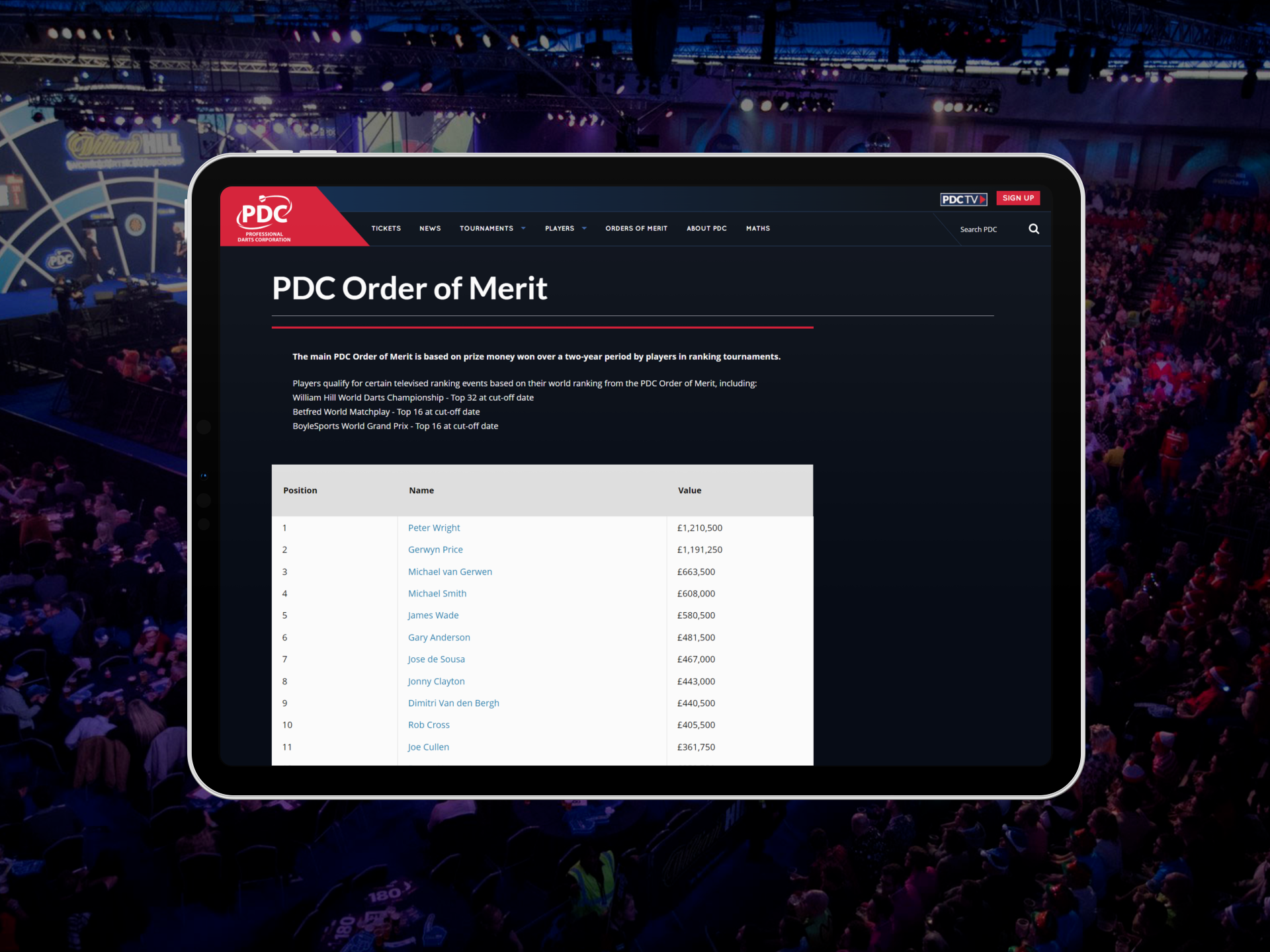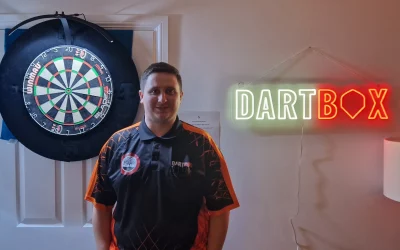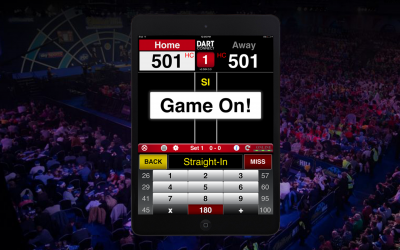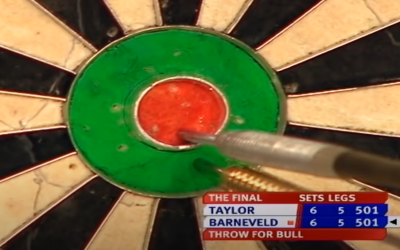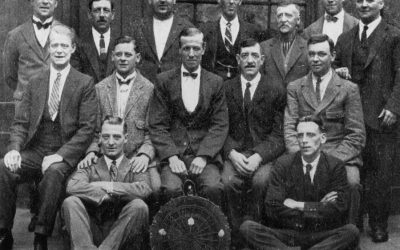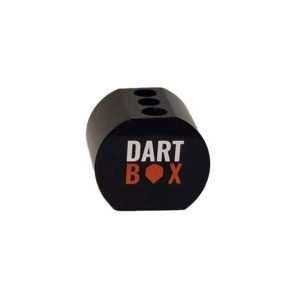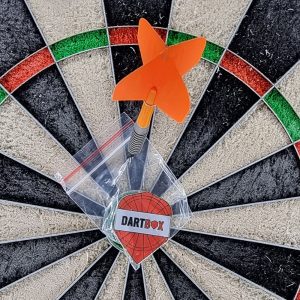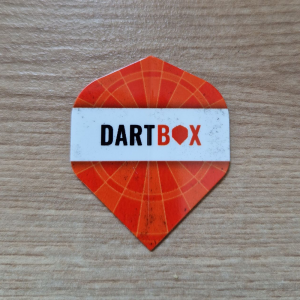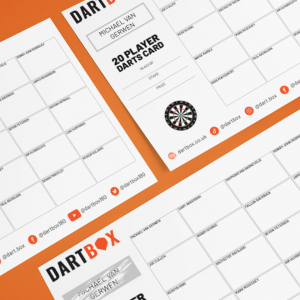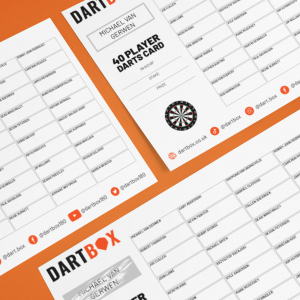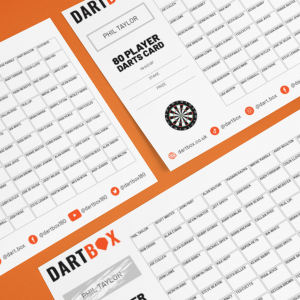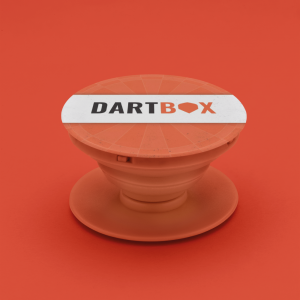The PDC is the world’s most well-known darts organisation, hosting many tournaments every year in a variety of locations around the world. As such, the organisation needs a way of ranking the hundreds of players who play in their events every year to serve two key purposes. For one, a ranking system allows the fans and players to keep track of form and to see who the best players in the world are. This will also allow a player to be known as the world number one, which is a prestigious honour. However, a ranking system within the PDC is essential for another reason, as the PDC have to fairly allocate the places for players within their ranking events, such as the World Championship. The PDC currently use the prize money that players win to rank their players, giving different tournaments different significances to the rankings as prize funds vary between events. The PDC chose to switch to a prize money system in 2007, as they had previously used a points-based system that was stopped after the 2007 World Championship. This system awarded points for the different finishing positions in events.
The current main ranking is known as the PDC Order of Merit, and it ranks players by the amount of prize money that they have won from ranking events in the previous two years. A ranking event is one that features fair qualification criteria, often from using a certain Order of Merit to assign places to players. The majority of PDC events are ranking events, but some non-ranking events are still held. The players receive the prize money that they win at non-ranking events, but the money does not count towards the PDC Order of Merit. Therefore, there is slightly less pressure on players to perform in these events. In addition, the ranking events usually occur at similar times every year, and so players will be under pressure if they are ‘defending’ prize money that they won at the same event two years earlier, as the amount that they won two years ago will be removed from the Order of Merit after the full two years have passed. The World Championship is the PDC’s biggest event, and it is a ranking event. This means that it is very significant for the Order of Merit due to its very large prize fund. The winner of the World Championship currently receives £500,000 in ranking prize money, and this often helps them to take the world number one spot instantly, or in the months that follow. The 2022 World Champion, Peter Wright, took the world number one spot for the first time, just three months after winning the event. The previous world number one was Gerwyn Price, who won the 2021 World Championship and instantly took the top spot on the Order of Merit. The other ranking events are the World Matchplay, UK Open, World Grand Prix, Grand Slam of Darts, Players Championship Finals and the European Championship, as well as the many individual Players Championship and European Tour events that make up the PDC Pro Tour. Currently, the top 32 players on the PDC Order of Merit receive a place at the PDC World Championship, whilst the top 16 players get places at the World Matchplay, and the World Grand Prix. These three tournaments are ranking events, but the main Order of Merit is also used to assign places for non-ranking events, such as The Masters.
The PDC also have a Pro Tour Order of Merit, which ranks players by their prize money won in Players Championship and European Tour events in the past year, rather than the past two years that is used in the PDC Order of Merit. This Pro Tour Order of Merit is used to determine the seedings for Players Championship and European Tour events, as it is more representative of a player’s form in these Pro Tour events. The top 32 players on the Pro Tour Order of Merit, who are not inside the top 32 places on the PDC Order of Merit, receive a place in the PDC World Championship. The top 16 players on the Pro Tour Order of Merit, who are not in the top 16 places on the PDC Order of Merit, also receive a place in the World Matchplay and the World Grand Prix.
There are also separate Order of Merit lists for both the Players Championship events and the European Tour events, that track the prize money won in these events during a year. The top 64 players on the Players Championship Order of Merit get to play in the Players Championship Finals, which is a major ranking event. The top 32 players on the European Tour Order of Merit qualify for a place in the European Championship, which is also a ranking major. The PDC also have some other tours which include the Challenge Tour, Development Tour and the Women’s Series. Each of these three tours has its own Order of Merit, which tracks the amount of prize money a player wins during the tour. The Challenge Tour is open to all players who do not have a PDC Tour Card, and the top two players at the end of the season on the Challenge Tour Order of Merit get a PDC Tour Card, as well as a place at the World Championship. The same is true for the Development Tour, but these events are only open to players aged between 16 and 23. The Women’s Series events are only open to women, and the top two players on the PDC Women’s Series Order of Merit get a place at the World Championship.
The PDC have a tour card system, with 128 players holding a tour card that allows them to play in Players Championship events and the qualifying tournaments for the European Tour events. Most of these tour cards last for two years, but the top 64 players in the PDC Order of Merit at the end of each season all automatically receive a tour card. Two-year tour cards are given to the top two players on both the Development Tour and Challenge Tour Order of Merits, with the rest of the tour cards being handed out at the Q-School events, which use a points-based ranking system to give tour cards to players who do not win one of the days outright.

